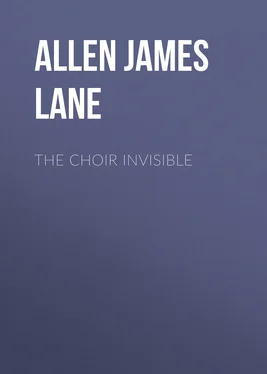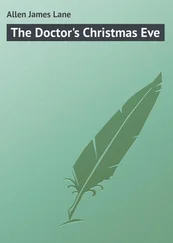James Allen - The Choir Invisible
Здесь есть возможность читать онлайн «James Allen - The Choir Invisible» — ознакомительный отрывок электронной книги совершенно бесплатно, а после прочтения отрывка купить полную версию. В некоторых случаях можно слушать аудио, скачать через торрент в формате fb2 и присутствует краткое содержание. Жанр: foreign_prose, foreign_antique, на английском языке. Описание произведения, (предисловие) а так же отзывы посетителей доступны на портале библиотеки ЛибКат.
- Название:The Choir Invisible
- Автор:
- Жанр:
- Год:неизвестен
- ISBN:нет данных
- Рейтинг книги:3 / 5. Голосов: 1
-
Избранное:Добавить в избранное
- Отзывы:
-
Ваша оценка:
- 60
- 1
- 2
- 3
- 4
- 5
The Choir Invisible: краткое содержание, описание и аннотация
Предлагаем к чтению аннотацию, описание, краткое содержание или предисловие (зависит от того, что написал сам автор книги «The Choir Invisible»). Если вы не нашли необходимую информацию о книге — напишите в комментариях, мы постараемся отыскать её.
The Choir Invisible — читать онлайн ознакомительный отрывок
Ниже представлен текст книги, разбитый по страницам. Система сохранения места последней прочитанной страницы, позволяет с удобством читать онлайн бесплатно книгу «The Choir Invisible», без необходимости каждый раз заново искать на чём Вы остановились. Поставьте закладку, и сможете в любой момент перейти на страницу, на которой закончили чтение.
Интервал:
Закладка:
Sometimes it was not Indian warfare but civil strife. One morning as many as three Daniel Boones appeared on the playground at the same moment; and at once there was a dreadful fight to ascertain which was the genuine Daniel. This being decided, the spurious Daniels submitted to be: the one, Simon Kenton; the other, General George Rogers Clark.
And there was another game of history—more practical in its bearings—which he had not taught them, but which they had taught him; they had played it with him that very morning. When he had stepped across the open to the school, he found that the older boys, having formed themselves into a garrison for the defence of the smaller boys and girls, had barricaded the door and barred and manned the wooden windows: the schoolhouse had suddenly become a frontier station; they were the pioneers; he was the invading Indians—let him attack them if he dared! He did dare and that at once; for he knew that otherwise there would be no school that day or as long as the white race on the inside remained unconquered. So had ensued a rough-and-tumble scrimmage for fifteen minutes, during which the babies within wailed aloud with real terror of the battle, and he received some real knocks and whacks and punches through the loop-holes of the stockade: the end being arrived at when the schoolhouse door, by a terrible wrench from the outside, was torn entirely off its wooden hinges; and the victory being attributed—as an Indian victory always was in those days—to the overwhelming numbers of the enemy.
With such an opening of the day, the academic influence over childhood may soon be restored to forcible supremacy but will awaken little zest. Gray was glad therefore on all accounts that this happened to be the day on which he had promised to tell them of the battle of the Blue Licks. Thirteen years before and forty miles away that most dreadful of all massacres had taken place; and in the town were many mothers who still wept for their sons, many widows who still dreamed of their young husbands, fallen that beautiful, fatal August day beneath the oaks and the cedars, or floating down the red-dyed river. All the morning he could see the expectation of this story in their faces: a pair of distant, clearest eyes would be furtively lifted to his, then quickly dropped; or another pair more steadily directed at him through the backwoods loop-hole of two stockade fingers.
At noon, then, having dismissed the smaller ones for their big recess, he was standing amid the eager upturned faces of the others—bareheaded under the brilliant sky of May. He had chosen the bank of the Town Fork, where it crossed the common, as a place in which he should be freest from interruption and best able to make his description of the battle-field well understood. This stream flows unseen beneath the streets of the city now with scarce rent enough to wash out its grimy channel; but then it flashed broad and clear through the long valley of scattered cabins and orchards and cornfields and patches of cane.
It was a hazardous experiment with the rough jewels of those little minds. They were still rather like diamonds rolling about on the bottom of barbarian rivers than steadily set and mounted for the uses of civilization.
He fixed his eyes upon a lad in his fifteenth year, the commandant of the fort of the morning, who now stood at the water edge, watching him with breathless attention. A brave, sunny face;—a big shaggy head holding a mind in it as clear as a sphere of rock-crystal; already heated with vast ambition—a leader in the school, afterwards to be a leader in the nation—Richard Johnson.
"Listen!" he cried; and when he spoke in, that tone he reduced everything turbulent to peace. "I have brought you here to tell you of the battle of the Blue Licks not because it was the last time, as you know, that an Indian army ever invaded Kentucky; not because a hundred years from now or a thousand years from now other school-boys and other teachers will be talking of it still; not because the Kentuckians will some day assemble on the field and set up a monument to their forefathers, your fathers and brothers; but because there is a lesson in it for you to learn now while you are children. A few years more and some of you boys will be old enough to fight for Kentucky or for your country. Some of you will be common soldiers who will have to obey the orders of your generals; some of you may be generals with soldiers under you at the mercy of your commands. It may be worth your own lives, it may save the lives of your soldiers, to heed this lesson now and to remember it then. And all of you—whether you go into battles of that sort or not—will have others; for the world has many kinds of fighting to be done in it and each of you will have to do his share. And whatever that share may be, you will need the same character, the same virtues, to encounter it victorious; for all battles are won in the same way, all conquerors are alike. This lesson, then, will help each of you to win, none of you to lose.
"Do you know what it was that brought about the awful massacre of the Blue Licks? It was the folly of one officer.
"Let the creek here be the Licking River. The Kentuckians, some on foot and some on horse, but all tired and disordered and hurrying along, had just reached the bank. Over on the other side—some distance back—the Indians were hiding in the woods and waiting. No one knew exactly where they were; every one knew they counted from seven hundred to a thousand. The Kentuckians were a hundred and eighty-two. There was Boone with the famous Boonsborough men, the very name of whom was a terror; there was Trigg with men just as good from Harrodsburg; there was Todd, as good as either, with the men from Lexington. More than a fourth of the whole were commissioned officers, and more fearless men never faced an enemy. There was but one among them whose courage had ever been doubted, and do you know what that man did? "After the Kentuckians had crossed the river to attack, been overpowered, forced back to the river again, and were being shot down or cut down in the water like helpless cattle, that man—his name was Benjamin Netherland—did this: He was finely mounted. He had quickly recrossed the river and had before him the open buffalo trace leading back home. About twenty other men had crossed as quickly as he and were urging their horses toward this road. But Netherland, having reached the opposite bank, wheeled his horse's head toward the front of the battle, shouted and rallied the others, and sitting there in full view and easy reach of the Indian army across the narrow river, poured his volley into the foremost of the pursuers, who were cutting down the Kentuckians in the river. He covered their retreat. He saved their lives.
"There was another soldier among them named Aaron Reynolds. He had had a quarrel some days before with Colonel Patterson and there was bad blood between them. During the retreat, he was galloping toward the ford. The Indians were close behind. But as he ran, he came upon Colonel Patterson, who had been wounded and, now exhausted, had fallen behind his comrades. Reynolds sprang from his horse, helped the officer to mount, saw him escape, and took his poor chance on foot. For this he fell into the hands of the Indians.
"That is the kind of men of whom that little army of a hundred and eighty-two was made up—the oak forest of Kentucky. "And yet, when they had reached the river in this pursuit and some twenty of the officers had come out before the ranks to hold a council of war and the wisest and the oldest were urging caution or delay, one of them—McGary—suddenly waved his hat in the air, spurred his horse into the river, and shouted:
"'Let all who are not cowards follow me!'
"They all followed; and then followed also the shame of defeat, the awful massacre, the sorrow that lasts among us still, and the loss to Kentucky of many a gallant young life that had helped to shape her destiny in the nation.
Читать дальшеИнтервал:
Закладка:
Похожие книги на «The Choir Invisible»
Представляем Вашему вниманию похожие книги на «The Choir Invisible» списком для выбора. Мы отобрали схожую по названию и смыслу литературу в надежде предоставить читателям больше вариантов отыскать новые, интересные, ещё непрочитанные произведения.
Обсуждение, отзывы о книге «The Choir Invisible» и просто собственные мнения читателей. Оставьте ваши комментарии, напишите, что Вы думаете о произведении, его смысле или главных героях. Укажите что конкретно понравилось, а что нет, и почему Вы так считаете.












